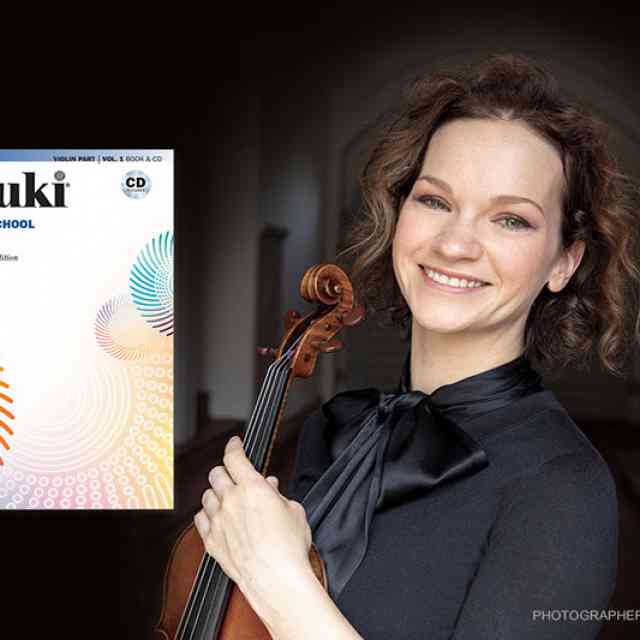This current issue of the Suzuki Journal is dedicated to the achievements and contributions of some of the SAA’s Black constituents. It is a pleasure to include here as part of the Chair’s Column an essay by Marla Majett, a long-time active SAA member.
“To study is to change….” – Shinichi Suzuki
When I think of study, it leads me to the idea of research: experiments, observation, study of trends, analysis of results, and ultimately, adjustment of methods and a new course of action. Then, the rounds of study continue—more experiments, observation, study of trends, analysis of results. And so on. Failure and mistakes are an integral part of the experimental process. We don’t always know the outcome of an experiment, but we always learn something. Study is fueled by curiosity.
Dr. Suzuki called his teaching “research,” hence the Japanese Suzuki school is called the “Talent Education Research Institute.” (TERI within the ISA.) As teachers, we strive always toward greater effectiveness, deeper knowledge, and new discoveries in our work with students and parents, our chosen field of research.
“…I change myself. This is study.” – Shinichi Suzuki
This (now complete) statement of Dr Suzuki’s is a model for the life-long learning we value so highly.
Change can be compelled by something radically new that enters our lives unbidden, such as COVID-19. Certainly this has required significant changes in our external lives. There is much we have learned, and have still to learn from this external situation. But let us consider internal changes, part of life-long learning.
Self-study is impelled by a question from inside. When I consider life-long learning, my curiosity leads me to ask, “What do I wish to study in myself? What or how do I wish to change?”
Often for me, internal questions arise when I see something familiar through a different lens. “If you want to see something different, walk the same path every day” (Confucius). The familiar paths of my mind become illuminated by a new idea, a new model toward which to strive, a self-reflective discovery that may bring joy, or may be painful.
Internal change requires the need for me to be humble and open. To change oneself requires the courage to ask questions, the persistence to study, and the humility to receive the results, similarly to the research process.
Dr Suzuki’s “New idea!” each day required courage, persistence, and humility. He studied for hours each day before most other people were even awake. We too have the opportunity each day for a new idea, the possibility of growth in ourselves: to see what is familiar through a new lens. And to study ourselves, in order to change for the better.
He is known to have said “without hurry, without rest,” when referring to students’ progress. He also said to those adults who trained with him, “If you think of something, do it right away.”
For the Happiness of Children,
Dr. Beth Cantrell
The Suzuki Philosophy and the Law of Harmony
As a young man studying the violin in Germany, Dr. Suzuki had an experience that changed his perspective about human relationships. After hearing Dr. Suzuki perform the Bruch violin concerto, an older woman was shocked at his ability to play it with the appropriate style—because he was Japanese. The great Jewish physicist, Dr. Albert Einstein, defended Dr. Suzuki by verifying that Dr. Suzuki was human just like them. This should not be a surprise.
Dr. Suzuki was overwhelmed by that experience. He also appreciated and applied the concept that Dr. Einstein and his circle of intellectuals practiced called “The Law of Harmony.” They made a point to invite Dr. Suzuki and make him feel welcome. They took the time to explain to Dr. Suzuki whatever they spoke about and valued his perspective—because it only enhanced the conversation and experience. Despite the differences in educational and cultural experiences, they made sure that Dr. Suzuki was part of their group. Their ability to be together while bringing varying voices and experiences enriched their friendship.
This edition of the American Suzuki Journal is a celebration of the voices, achievements, and contributions of Suzuki students, teachers and parents of African descent throughout the Americas. Although our voices and experiences differ, our commitment to and love of the Suzuki Philosophy adds a level of authenticity that is necessary for the health of our organization. The Suzuki Philosophy is precious to us, as it speaks to our existence as people who have no choice but to work within a racist system. Suzuki is anti-racist at its core with the embrace of inclusion and recognition of the dignity of each individual.
The Law of Harmony is practiced as we hear the voices of Black teachers, parents and students across the Americas and Caribbean. The voices of the Black membership matter as we learn to harmonize with each member in the Suzuki community. There is a little bit of give and take, but a lot of listening is necessary for us to be in complete harmony with each other.
As we apply the Law of Harmony in our organization, let us remember the beauty that results as we work together as a community. This is the time for all of us to give back. Our music is a beautiful gift that is needed more than ever as we face tumultuous times. Music is not only a healing balm to ease our soul, but it also brings us together.
We are excited to celebrate Dr. Suzuki’s vision and to work tirelessly to make his vision a reality. The Suzuki Philosophy appeals to people everywhere simply because it is based on the belief that every child is capable of more than we can ever imagine. Dr. Suzuki had an inclusive spirit—and for that reason alone, our organization should be standard bearers of what inclusion looks like in music education. Thank you for allowing us to share our voices in this special edition.
– Marla Majett
Suzuki Cello Teacher
Atlanta, Georgia







